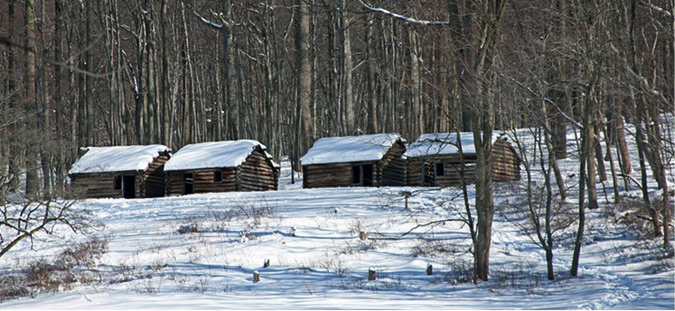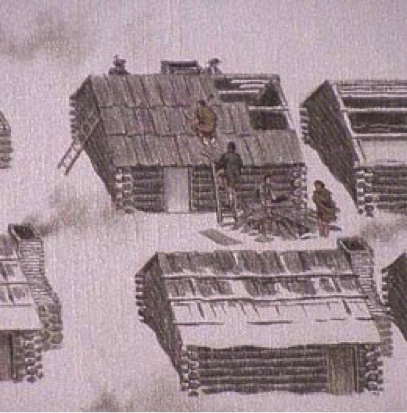
Laura's Blog

"The Hard Winter" when Peggy met Hamilton
January 1, 2018


While we shiver through the artic blast currently gripping the country, this is nothing compared to “The Hard Winter” of 1779/1780, the most brutal winter in recorded history. Snows began falling in late November and didn’t end until early April. Twenty-eight major storms hit the East Coast that winter; the winter the Continental Army hunkered down in Jockey Hollow, just outside Morristown, New Jersey. It was also the winter Alexander Hamilton entered the lives of the Schuyler sisters.
January 1st, 1780: The region had just been blasted with three “Nor’easters” and patriots were struggling through snowdrifts four to six feet deep. The cold was so persistent—(January sunrise temperatures included a high of 26 F to a low of -22)—that for the only time known by Americans all the saltwater inlets, harbors, and sounds along the Atlantic coast, from North Carolina to Maine, froze over and closed to ships. The ice in the Hudson River just above NYC was measured at 18 feet thick. Sleighs, cavalry units, even heavy cannon crossed the ice from Staten Island to Manhattan. So too with Virginia’s wide York River, 350 miles to the south. The vast Chesapeake Bay froze enough for red fox, brought to the Eastern Shore by English settlers, to wander across 10 miles of ice and begin populating on the mainland. But thousands of birds and other wild animals perished in the unabated freezing temperatures.
We hear often about the killing winter at Valley Forge. But Morristown was worse. Here is how patriots who had to hastily construct log-huts as they stood in snowdrifts up to their hips described those months:
Dr. James Thacher, surgeon: “On Jan. (3rd) we experienced one of the most tremendous snow-storms ever remembered; no man could endure its violence many minutes without danger of his life…some of the soldiers were actually covered while in their tents, and buried like sheep under the snow. My comrades and myself were roused from sleep by the calls…they were almost smothered in the storm… but the sufferings of the poor soldiers can scarcely be described; while on duty they are unavoidably exposed to the inclemency of the storms and severe cold; at night they (have) a single blanket… the (snow) so obstructs the roads as to prevent our receiving a supply of provisions. For the last ten days we have only received but two pounds of meat a man, and we are frequently for six to eight days entirely destitute of meat and then as long without bread…”
Joseph Plumb Martin, a 19-year-old private in 1780, who would fight in every major battle of the Revolution: "At one time it snowed the greater part of four days successively, and there fell nearly as many feet deep of snow, and here was the keystone of the arch of starvation. We were absolutely, literally starved:--I do solemnly declare that I did not put a single morsel of victuals into my mouth for four days and as many nights, except a little black birch bark which I gnawed off a stick of wood....some of the officers killed and ate a favourite little dog that belonged to one of them.—if this was not "suffering" I request to be informed what can pass under that name."
I always cry at some point when writing my historical novels. I am so moved by what people had to endure, and often with such dignity and largesse, especially during wars. Describing starving foot soldiers in the snow at Morristown is what broke me in this one.
PBS filmed a wonderful 30-minute program about Jockey Hollow that gives a real taste of their stubborn courage and dogged camaraderie: https://www.youtube.com/watch?v=lx5YkyHuPvQ .
During this cruel cold and deadly snow, Peggy Schuyler received a letter from Alexander Hamilton. The aide-de-camp had just met and was already besotted with her sister, Eliza, who was visiting their uncle, the army’s chief surgeon, in Morristown. Hamilton’s letter was a playful introduction of himself and a plea for Peggy’s help in his courtship of Eliza. After teasingly saying Eliza was wrecking the officers’ concentration by turning their heads with her beauty, he ended his letter to Peggy with: “It is essential to the safety of the state and to the tranquility of the army that one of two things take place; either that she be immediately removed from our neighbourhood, or that some other nymph qualified to maintain an equal sway come into it. By dividing her empire it will be weakened and she will be much less dangerous when she has a rival equal in charms to dispute the prize with her. I solicit your aid.”
HAMILTON AND PEGGY! A REVOLUTIONARY FRIENDSHIP opens with that letter. To see an excerpt of the novel’s first 27 pages, go to my website: http://lmelliott.com/book_landing_page_historical/hamilton-and-peggy-revolutionary-friendship
All I’ll say is: the girl had some serious spunk.

Other Blog Posts
Click Here to See All of Laura's Blog Posts
